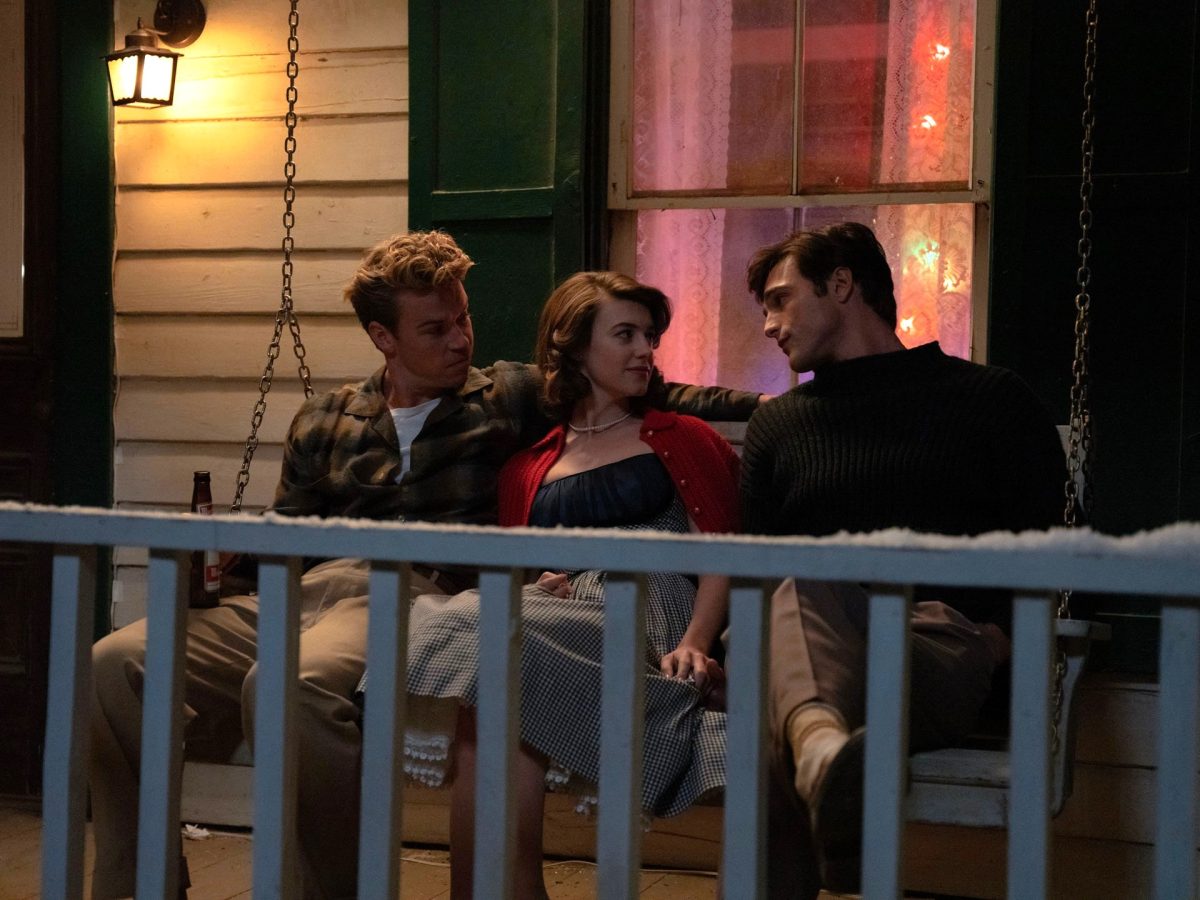I shamelessly allow my favorite actors to dictate my watchlist. Because of this, I didn’t need much convincing to see the adaptation of Shannon Pufahl’s 2019 novel “On Swift Horses.” Its stars couldn’t pander more to a Gen Z audience — Daisy Edgar-Jones, Jacob Elordi and Will Poulter lead the pack — but Daniel Minahan’s film lacks the momentum to keep you captivated past the eye candy and soapy plot.
Set after the Korean War in the 1950s, “On Swift Horses” details the relationship between Muriel (Edgar-Jones), her new husband Lee (Poulter) and Lee’s brother Julius (Elordi), as the newlyweds dream of starting their lives out in California. It’s established early on that Julius is a wild card: a drifter with an insatiable love for poker who instantly connects with Muriel after meeting in Kansas. But this isn’t a “Challengers” situation — we discover they’re both attracted to the same sex at a time when American culture is inundated with the idea of upholding traditional values and family dynamics.
Muriel and Julius undergo parallel journeys to accept their sexualities while sharing another commonality: gambling. At her diner job in San Diego, Muriel eavesdrops on her patrons’ discussions about horse racing and makes a secret fortune through betting, stashing her earnings inside her purse stitching or under her bedroom mirror. Julius doesn’t meet them in California initially — instead, he tries his luck with poker in Las Vegas, scoring a job at a casino snuffing out cheaters. It’s obvious, though, that the stakes are highest in their respective love lives. There’s unrest in Muriel’s cookie-cutter suburban home when she’s drawn to her neighbor Sandra (Sasha Calle), and Julius is enraptured by Henry (Diego Calva), a fellow casino worker trying to swindle players.
It’s no surprise that the hallmark of “On Swift Horses” is its performances — after all, the film is modeled after the sweeping melodramas of the time. Edgar-Jones is a standout, effortlessly portraying Muriel’s restlessness in her marriage and her desire for something outside her model neighborhood. Wide shots of her at home are suffocating, met with somber indifference that only serve to highlight that Muriel is happiest when cashing out at the horse tracks or spitting olive pits into Sandra’s hands. While there’s little romantic chemistry between Muriel and Lee, Poulter is a worthy scene partner when he’s actually on screen. He’s a middle man in his own marriage but also in his family, failing to recognize his wife’s sexuality by shirking off his brother’s behavior: “He’s just not like us,” Lee assures Muriel.
Henry is a firecracker on screen, an impulsive heartthrob who cheekily taunts Julius until the two are in the privacy of their bed. Calva’s just as strong here as his dynamic performance in the criminally underrated “Babylon,” with Henry’s long gazes and flirtatious dancing creating palpable tension to lure Julius in. But their relationship lacks substance, likely because Elordi can’t sell us on Julius’ longing the way his counterparts can. Julius is played with stiffness, often making his deep emotional connection with Muriel seem unbelievable and his sexual yearning for Henry seem unfounded. Subtleties like glances or lingering touch are lost in Julius’ scenes, and sweeping gestures like a corny horseback ride into the sunset take you entirely out of the world contrived in “On Swift Horses.”
The drama’s pacing is deliberately slow, yet the plot still suffers from confounding metaphors and little payoff outside of a few climactic moments. In between exploring the relationship dynamics between Muriel, Lee and Julius, Minahan’s film tries to fit in discussion about the lack of protected LGBTQ+ spaces in the ’50s, eminent domain and mentions of the atomic bomb all at the same time, through more inanimate objects than you can remember. While the first theme is a pretty significant setting in “On Swift Horses,” with the bar being a place to mourn missed connections and have sexual epiphanies, cutting between scenes of police raids in San Diego to casino managers beating up crooks in Las Vegas becomes repetitive pretty quickly. Ironically, though, the best moment in the film is drawn out and speechless — Lee and Muriel share a silent car ride home after he catches her at Sandra’s instead of work. Lee reckons with the deconstruction of his American dream and the realization that Muriel is just like his brother, and Muriel realizes she’s chasing losses.
I don’t envy any casting director in Hollywood, especially not the ones in charge of assigning roles for the ultimately lackluster “On Swift Horses.” At a time when our politics and societal ideals are leaning toward similar right-wing, traditional values witnessed during the Eisenhower era, it’s more important than ever to tout LGBTQ+ media that reminds us there is no such thing as an “us vs. them,” the way Lee tries to convince Muriel. But when your only form of marketing is sex scenes and a conventionally attractive A-list cast, this drama is a risky, ultimately futile gamble.
Contact Dani Biondi at [email protected].


























































































































































